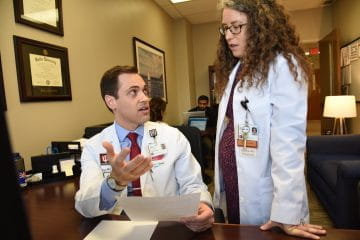Housed within Riley Children's Health's Pediatric Care Center in Indianapolis, the Autism Spectrum and Development Disorders Outpatient Program hosts the Postdoctoral Psychology Fellowship in Autism program. This fellowship includes a combination of clinical service in the form of assessment and treatment of individuals diagnosed with autism spectrum disorder and other neurodevelopmental disorders.
Fellows spend 20–30 hours with clients per week. Up to eight hours per week are dedicated to administration and research endeavors. Fellows can also expect weekly supervisory sessions with a PhD, HSPP psychologist. Fellows will also receive extensive training in the assessment of autism spectrum disorder and other neurodevelopmental disorders and, including training and supervision on the Autism Diagnostic Observation Schedule (ADOS-2) by a certified, independent ADOS-2 trainer (Dr. Minshawi).
For the upcoming 2025–2026 academic year, fellows will tailor their clinical schedules across core and affiliated clinics with additional opportunities possible based upon supervisor and clinic availability:
-
Complex Diagnosis Program: This program provides comprehensive evaluation of children and teens (ages 5–17 years) with interfering behaviors and skill deficits and concerns for autism spectrum disorder. Presentations are often complicated by medical and/or psychiatric complexity. Visits include a diagnostic interview, behavioral observations, record review, and individually-tailored testing plans which can include ADOS-2, behavior/psychiatric rating scales, cognitive testing, and adaptive behavior assessment. Families return later for diagnostic feedback.
-
Individual/Family-based Brief Therapy Program: A short-term, solutions-focused program for children (ages 3–17 years) on the autism spectrum or other neurodevelopmental disabilities. Children present with a wide variety of concerns including interfering behaviors (e.g., tantrums, self-injury), adaptive skill difficulties (e.g., toileting, sleep), and co-occurring mood/anxiety concerns. Families meet weekly to bi-weekly with their therapist to develop targeted treatment plans and learn skills that facilitate the child’s success. In-person and virtual individual- or family-based therapy is provided using modified cognitive behavior therapy, parent coaching, and adaptive skills training.
-
PEERS Bootcamp Program: This program provides consolidated seven-week virtual bootcamps based upon the PEERS teen curriculum (i.e., Friendship Skills; Conversational Skills). Teens (ages 12–17 years) with social skill difficulties and their parent(s) attend weekly virtual group meetings.
-
RUBI Parent Coaching Program: An evidenced-based 12-15 week curriculum for parents of children (ages 5–12 years) on the autism spectrum or with other neurodevelopmental disabilities. Parents learn behavioral parenting skills and strategies to decrease interfering behaviors (e.g., mild/moderate aggression, tantrums, noncompliance) and teach their child adaptive skills. Parents meet weekly to bi-weekly with their therapist via either virtual parent group or individual family therapy format. Families are triaged into which format is best for their unique needs.
-
Down Syndrome and Developmental Regression Clinic: Located at the Adult Outpatient Clinic, the Down Syndrome and Developmental Regression Clinic provides psychopharmacology, psychotherapy, diagnostic clarification, and care coordination services to families of individuals with Down syndrome (ages 5 thru adulthood) who have experienced a loss in functioning due to psychiatric co-occurring conditions, developmental regression, catatonia, trauma or major life-changes, early-onset dementia, and/or exacerbating medical factors.


